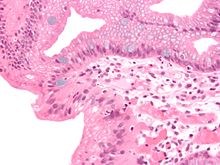- Metaplasia
-
-plasia Anaplasia – dedifferentiation Hyperplasia – physiological proliferation Increase in number of cells Neoplasia – abnormal proliferation Dysplasia – maturation abnormality Metaplasia – cell type conversion Prosoplasia – cell type develops new function Desmoplasia – connective tissue growth Metaplasia Classification and external resources 
Micrograph of a gastro-esophageal junction with pancreatic acinar metaplasia. The esophageal mucosa (stratified squamous epithelium) is seen on the right. The gastric mucosa (simple columnar epithelium) is seen on the left. The metaplastic epithelial is at the junction (center of image) and has an intensely eosinophilic (bright pink) cytoplasm. H&E stain.MeSH D008679 Metaplasia (Greek: "change in form") is the reversible replacement of one differentiated cell type with another mature differentiated cell type. The change from one type of cell to another may generally be a part of normal maturation process or caused by some sort of abnormal stimulus. In simplistic terms, it is as if the original cells are not robust enough to withstand the new environment, and so they change into another type more suited to the new environment. If the stimulus that caused metaplasia is removed or ceases, tissues return to their normal pattern of differentiation. Metaplasia is not synonymous with dysplasia and is not directly considered carcinogenic. It is also contrasted with heteroplasia, which is the abnormal growth of cytologic and histologic elements without a stimulus.
Contents
Causes
When cells are faced with physiological or pathological stresses, they respond by adapting in any of several ways, one of which is metaplasia. It is a benign (i.e. non-cancerous) change that occurs as a response to chronic physical or chemical irritation, such as cigarette smoke that causes the mucus-secreting ciliated pseudostratified columnar respiratory epithelial cells that line the airways to be replaced by stratified squamous epithelium, or a stone in the bile duct that causes the replacement of the secretory columnar epithelium with stratified squamous epithelium (Squamous metaplasia). Although metaplasia is an adaptation that replaces delicate cells with hardier ones that are more likely to be able to withstand the stresses that the epithelium is faced with, it is also accompanied by a loss of epithelial function, and is considered undesirable; this undesirability is underscored by the propensity for metaplastic regions to eventually turn cancerous if the irritant is not eliminated. Specialized epithelial cells are already differentiated, and cannot simply transform their morphologies to change from one cell type to another. Metaplasia, then, does not occur as a result of any change in the pre-existing epithelial cells but rather as a result of reprogrammed stem cells present in the organ's connective tissue that are nudged along a different pathway of differentiation by cytokines, growth factors and other substances in the cell's environment. In a nutshell, metaplasia occurs by stem cells that reprogram differentiation of cells rather than by transdifferentiation.
Therapy
The medical significance of metaplasia is that in some sites cells may progress from metaplasia, to develop dysplasia, and then malignant neoplasia (cancer). Thus, at sites where metaplasia is detected, efforts are made to remove the causative irritant, thereby decreasing the risk of progression to malignancy. The metaplastic area must be carefully monitored to ensure that dysplastic change does not begin to occur. A progression to significant dysplasia indicates that the area could need removal to prevent the development of cancer.
Examples
Barrett's esophagus is an abnormal change in the cells of the lower esophagus, thought to be caused by damage from chronic stomach acid exposure.
The following table lists some common tissues susceptible to metaplasia, and the stimuli that can cause the change:
Tissue Normal Metaplasia Stimulus Airways Pseudostratified columnar epithelium Squamous epithelium Cigarette smoke Urinary bladder Transitional epithelium Squamous epithelium Bladder stone Esophagus Squamous epithelium Columnar epithelium Gastro-esophageal reflux (Barrett's Esophagus) Notes
- The AMA Home Medical Encyclopedia, Random House, p.683
- Robbins and Cotran - Pathologic Basis of Disease, 7th Edition, Saunders, p. 10
Categories:- Histopathology
- Oncology
- Oncology stubs
- Pathology stubs
Wikimedia Foundation. 2010.

